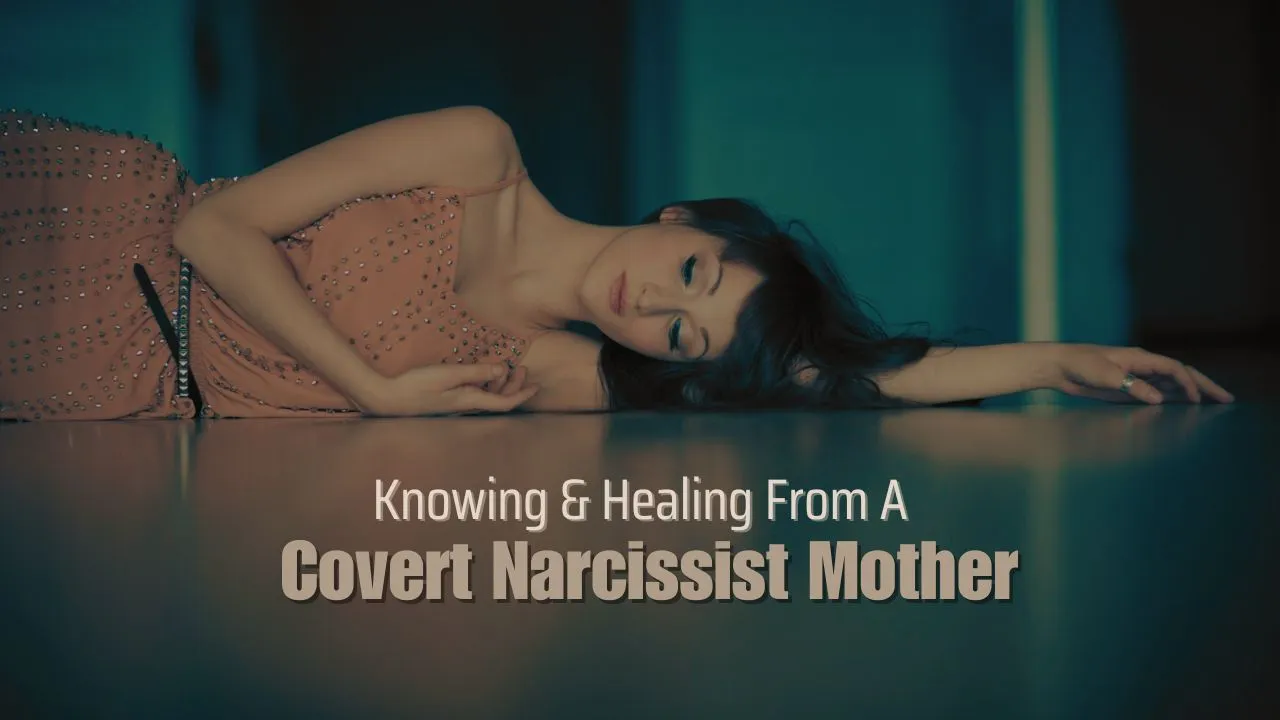Reading time: 6 minutes
— Reviewed by Dr. Sandip Roy.Growing up with a covert narcissist mother is a scarring experience. Emotionally, she might have put at least one of her kids through one of the toughest childhoods.
This study found that adult children of narcissists judged their childhood experiences as:
- “It’s a brutal way to be raised.”
- “A way forward: it was them, not me.”
- “I see the tentacles of how deep and far and wide it goes.”
If you have or had a covert narcissist mother, then read through to understand how they function, what their nature is, and how they afflict their children.
How To Know A Covert Narcissist Mother
These are the four main traits of a covert narcissist mother:
1. They will mark out “The Golden Child”.
Covert narcissist mothers target one high-empathy child as their main supply source of admiration and attention. This is known as “golden child syndrome.”
The golden child experiences “emotional incest.” Their childhood is spent putting their adult mother’s emotional needs before their own.

In return, this “golden child” gets conditional love. To gain their narcissist mother’s approval, they must be perfect and fulfill all her needs and expectations. Or else, they get criticized and demonized.
This is classic manipulation, using overpraise and love-bombing to turn the child into an emotional crutch for the mother’s needs.
The child is made to believe their self-worth depends on pleasing their narcissist mother; otherwise, they feel worthless.
Later on, it can lead to anxiety, trust issues, and codependency in relationships outside the family.
2. They will play the “Self-Sacrificing Saint”.
These mothers often present themselves as victims or martyrs.
They are loud with their claims of making sacrifices for their children. This behavior is designed to make the kids feel indebted to her.
For instance, instead of taking her child to a doctor, she might give her daughter diet pills, saying she used her savings to buy this “gift” to make her more presentable and desirable.
This disguising of self-centered acts as help, sacrifice, or gifts erodes the child’s social confidence.
They grow up confused about accepting help from anyone, feeling it would make them indebted.
3. They will compete with and minimize their child.
A covert narcissistic mother often competes with her children while minimizing their needs.
Minimizing involves downplaying or negating the child’s feelings, achievements, or experiences, making the child feel unimportant.
She might also try to outdo her kids, making them feel like they can never be good enough compared to her.
When things go wrong in the family or the household, she finds a way to blame her children.
She refuses to take responsibility, even when the issue is of her own doing. This pushes the child to feel constantly guilty and at fault for anything that goes wrong.
4. They will isolate and sow self-doubt in the child.
She often creates false narratives about others being treacherous while self-aggrandizing her qualities.
Her chronic lying, gaslighting, and manipulativeness make it difficult for the child to trust anyone but her.
This creates an isolating existence for her children.
Over time, the child starts to feel secure only in their own space. This false sense of “safety in isolation” leads them to doubt their own perceptions and memories.
The child grows up lonely and unsure of themselves, never feeling safe to share their vulnerabilities with others.

How A Covert Narcissist Mother Affects Her Children
A covert narcissist mother, beneath her surface-level love, can deeply damage her children’s emotional psyche.
- Negative Core Beliefs: The child internalizes the mother’s subtle manipulations and emotional neglect. And grow to have some negative core beliefs — like feeling unworthy of love, unlovable, or responsible for their mother’s happiness. These beliefs can persist as adults, lowering their self-esteem and confidence.
- Conditional Love: The covert narcissist’s love comes with conditions attached. The child learns that unless they prioritize their mother’s needs and feelings, they won’t get her approval or love. They develop a confusing and insecure sense of self.
- People-Pleasing Tendencies: These children often become people-pleasers. The mother’s constant, veiled demands for attention and admiration train the child to prioritize others’ needs over their own. This can lead to difficulty setting boundaries and saying “no” in adulthood.
- Emotional Burdening: The covert narcissist mother burdens the child with her emotional needs. She can strengthen this with guilt trips, playing the victim, or demanding constant reassurance. The child becomes an emotional crutch, unable to set healthy emotional boundaries.
- Low Self-Esteem: The constant pressure to please and the lack of genuine validation can lead to low self-esteem and feelings of inadequacy. They cannot self-validate. They desire someone to tell them that they are doing the right thing, expressing the right emotion, or wearing the right look.
- Codependency: Children of covert narcissists are known to struggle with codependency. They form unhealthy attachments in romantic relationships, depending on their partner like they did on their mother.
- Difficulty with Trust: The manipulative and unpredictable nature of the narcissistic mother can make it difficult for the child to trust their own judgment and form healthy, trusting relationships.
That said, not all children of covert narcissists will experience those effects.
Healing And Moving Forward After A Covert Narcissist Mother
You can heal from the emotional wounds of a covert narcissist mother. Consider these initial steps:
- Acknowledge and Validate Your Experience: First, recognize and accept that what’s wrong with you is not your fault, but because of your mother’s behavior. Allow yourself to feel the difficult emotions — anger, frustration, sadness, regret, confusion, or any other.
- Self-Compassion and Breaking the Cycle: Once you reach an agreement with yourself that those negative experiences were not your fault, learn to forgive yourself. Especially your younger self. Break the cycle of people-pleasing and self-sacrificing. Develop self-compassion. This will start the healing process for you.
- Set Healthy Boundaries: Adult children of covert narcissists often struggle to set boundaries. They allow anyone to intrude on their personal space, time, and objects. Learn to speak out about what you won’t tolerate, focus unabashedly on your needs and wants, and say “no” to more people and things. The way to conquer fear is to do it despite trepidation and palpitation.
- Challenge Negative Beliefs: You may not realize how many negative core beliefs your narcissist mother may have instilled in you. Challenge these; try self-affirmations and positive self-talk. Consider journaling to help rewrite your internal narrative.
- Rebuild Your Identity: Narcissistic parents leave their children feeling like extensions of themselves. Work on crafting a separate identity from your mother’s. Answer yourself honestly, what are your interests, values, and goals? Consider therapy or joining a support group to help your self-discovery.
Final Words
Growing up with a covert narcissist mom is going through daily abuse and trauma. The scars are raw well into adulthood.
But you can completely heal yourself. Start with the notion that it will be a process, and in certain instances, a process that will last a lifetime.
Be patient with yourself. Celebrate every small positive change in yourself. In time, you’ll build a new, trauma-free, happy version of yourself.
√ Also Read: Troubling Symptoms of Daughters of Narcissistic Mothers
√ Please spread the word if you found this helpful.
• Our Story!